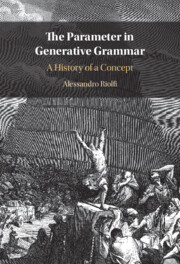Book contents
- The Parameter in Generative Grammar
- The Parameter in Generative Grammar
- Copyright page
- Contents
- Acknowledgments
- Introduction
- 1 The Birth of the Concept of Parameter in Generative Grammar and Its Development until Lectures on Government and Binding
- 2 The Formulation of the Main Parameters of the Government-Binding Theory
- 3 The Development of the Concept of Parameter in Minimalism
- 4 The Main Parameters of the Government-Binding Theory in Current Generative Theory
- 5 The Head-Complement Parameter
- 6 Some Concluding Remarks on Parameterization
- References
- Index of Languages
- Index of Names
- Subject Index
2 - The Formulation of the Main Parameters of the Government-Binding Theory
Published online by Cambridge University Press: 17 April 2025
- The Parameter in Generative Grammar
- The Parameter in Generative Grammar
- Copyright page
- Contents
- Acknowledgments
- Introduction
- 1 The Birth of the Concept of Parameter in Generative Grammar and Its Development until Lectures on Government and Binding
- 2 The Formulation of the Main Parameters of the Government-Binding Theory
- 3 The Development of the Concept of Parameter in Minimalism
- 4 The Main Parameters of the Government-Binding Theory in Current Generative Theory
- 5 The Head-Complement Parameter
- 6 Some Concluding Remarks on Parameterization
- References
- Index of Languages
- Index of Names
- Subject Index
Summary
Chapter 2 presents the research on parameters within GB Theory. After classifying the parameters from Rizzi’s (2014) list into five different types, the chapter reviews the null subject parameter (Rizzi 1978), the parameterization of Subjacency (Rizzi 1978), and the parameter of S′-deletion (Chomsky 1981a). Some influential proposals which were originally formulated as non-parametric systematic differences are then reviewed, namely Huang’s (1982) insights on the locus of wh-movement, Kayne’s (1983) treatment of preposition stranding and epistemic verbs, and den Besten’s (1983) account of V2. The next section discusses Hale’s (1983) parameterization of the Projection Principle, Baker’s (1988) analysis of incorporation processes, Pollock’s (1989) split INFL hypothesis, and lastly, Koopman and Sportiche’s (1991) proposed cross-linguistic difference in nominative Case assignment. The chapter ends by covering some influential proposals concerning language acquisition, that is, Hyams’s (1986) hypothesis that parameters have preset default values, Manzini and Wexler’s (1987) parameterized notion of governing category, and finally, the latter’s link to the Subset Principle.
Keywords
- Type
- Chapter
- Information
- The Parameter in Generative GrammarA History of a Concept, pp. 34 - 151Publisher: Cambridge University PressPrint publication year: 2025

